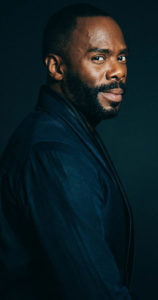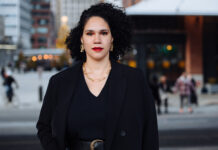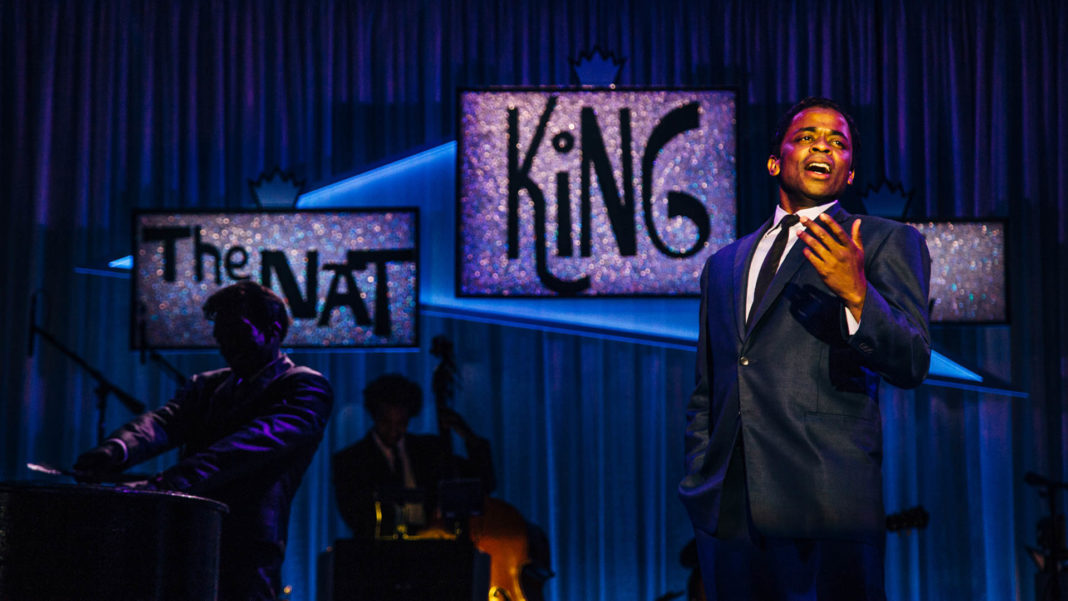How you know Colman Domingo might depend on what type of entertainment you prefer. If you’ve seen the Oscar-nominated If Beale Street Could Talk, you know Domingo as “Joseph Rivers.” If you watch Fear the Walking Dead you know him as “Victor Strand.” If you’ve seen Passing Strange or The Scottsboro Boys on Broadway, then you might know him from his roles there. And if you saw Summer: The Donna Summer Musical, he was one of the writers of the book for that show which originated at the La Jolla Playhouse.

If you attend Lights Out: Nat “King” Cole at the Geffen Playhouse you’ll see his work as co-writer of the show (with director Patricia McGregor). In other words, Domingo is a true multi-hyphenate with a lot on his mind and a wide range of skills.
Lights Out imagines what might have been going through singer Nat “King” Cole’s mind during his 1957 Christmas special. Dulé Hill (The West Wing and Suits) plays the singer. If you don’t know Cole by name, you probably know his many recordings and his silky smooth voice. Amongst his best known songs are Unforgettable, Mona Lisa and Nature Boy.
I recently spoke with Domingo about Lights Out, Cole and his battles with racism and where America is in 2019.
When I read the script for Lights Out it reminded of the real-versus-the surreal found in Bob Fosse’s All that Jazz. Is that kind of balancing act what you were going after?
I think All That Jazz, The Scottsboro Boys, Passing Strange are all influences because I’m trying to be a bit sly about deconstructing an icon, the United States, race, gay rights and women’s rights. It’s to use this framework of this final show and pulling the rug out.
How and why did you choose Nat “King” Cole?
Anything 1950s is seductive: line dresses and gentlemen in well-structured suits and slick hair. We want to surprise you. This definitely has been written with a fervor and fire and passion. The beautiful thing is this commission allowed me to do whatever was on my mind and this was it. This is one of those pieces of theatre that if I left the theatre tomorrow, this is everything I want to say. It takes a long time to clarify what is our voice. This is mine.

What makes Nat “King” Cole still relevant today and why should people who don’t know of him be interested?
I think because of where we are right now with so much unrest and interrogating exactly who we are. Which is why James Baldwin (author of If Beale Street Could Talk) was always the conscious of America and who we are. We are trying to examine who we are in America and we have to go backwards because we can’t go forward. By examining an America icon through the lens of 2019, hopefully we can come to some answers.
Though subjected to racism himself (including attacks on his home in Hancock Park), Cole performed for segregated audiences in the South. He was chastised in the mid-50s by the NAACP for not being a crusader. Was that fair and do you think he could have and should have done more?

It’s funny the term “crusader.” As I examined what he was doing, he was being a crusader in a more subversive way. I think there’s a necessity for people to be out there and marching in the street. And there are also people who should be standing with grace and love in the face of terror. Everything Cole represented knew it wouldn’t seem like he was crusader. Not everyone was barking loudly and holding signs. But he was showing his face. Some are sitting quietly doing their work and showing up day after day. I am a man and I stand up and put on a suit and sing better than anyone else. I think that was what he did. I think he was criticized unfairly.
Cole once said, “The Supreme Court is having a hard time integrant schools. What chance do I have to integrate audiences?”
Cole had a lot of incredible thoughts, but he understood. I think he was always looking at the bigger picture and not the immediate. I read an article for Ebony in 1958 about why his show wasn’t a success – because he couldn’t get sponsors. He said, “Madison Avenue is afraid of the dark.” He had one of the most successful records ever. But he had to call in favors and use his own money. But by his being there, he made a difference.

How far do you think we’ve come since Nat “King” Cole’s time?
Our country is so separated. We have to be smart. We’d like to think we live in a country of the free, but it’s only for a certain group of people. These days white and black alike should talk about this. Let’s do this. Let’s affect our friends, cousins and others who don’t think like us. We have to reach across and understand why you feel the way you feel and I feel the way I feel. If we approach more with love, there’s no idea where we can go. When I write what I’m actually trying to do is bring people together. We raise the question. Now what will you do? It’s your turn.
What do you think Nat “King” Cole would think of American in 2019? (Domingo takes a long pause before answering the question.)
I don’t know. I think that he would recognize how far we’ve come by looking at the great representations of our ancestors and everyone who is benefitting and overcoming great obstacles. But I think he would also recognize how far we had not come. I think he’d be torn. He was very astute about recognizing what he was and what America was.
Lights Out: Nat “King” Cole continues at the Geffen Playhouse through March 17th.
Production photos by Jeff Lorch/Courtesy of the Geffen Playhouse
Nat “King” Cole photo by Avery Willard/Courtesy of the New York Public Library











